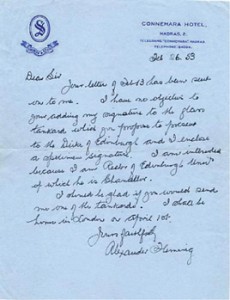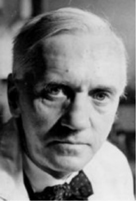Registered with the Registrar of Newspapers for India under R.N.I 53640/91
Vol. XXVI No. 04, June 1-15, 2016
When Alexander Fleming visited Madras

I wonder how many recall Alexander Fleming and his visit to Madras. Alexander Fleming (1881-1955) was a British medical doctor and a microbiologist, who was awarded the Nobel Prize in 1945 for discovering the remarkable antibiotic, penicillin. He was born in Ayrshire, Scotland in August 1881. He studied medicine and served as a surgeon during World War I. Fleming discovered an antibacterial fungus, Penicillium, in 1928, from which the active principle penicillin was derived. This discovery paved the way for a new era of antibiotics in the medical world.
Fleming died in March 1955. Two years before his death, he visited Madras as a member of a World Health Organisation (WHO) Delegation.
Talking of antibiotics, we need to recall the immense discovery of streptomycin (also from another fungus) by Selman Waksman and his team (Rutgers, New Jersey) in the 1940s. He too was recognised with a Nobel Prize in the 1950s. And it was a remarkable person with Madras roots, Yellapragada Subbarow, who, while working with the American Cynamid (New York), developed tetracycline. This discovery by Subbarow and team is, however, contested by American science historians.
Now back to Fleming and his visit to Madras.

Fleming came to Madras in February-March 1953 to evaluate Indian Medical Services. On reaching Madras, he met C.K. Prasada Rao, then Dean of the Madras Medical College (MMC) in an informal context. From March 7th, his visit to Madras commenced formally, meetings occurring with Subramaniam (then Finance Minister) and Attavar Balakrishna Shetty (then Health Minister) of the Rajaji Cabinet. On February 9th, Fleming visited the King Institute of Preventive Medicine (Guindy) to inspect vaccine (smallpox, cholera, and typhoid) production. It is possible that Ramakrishna Venkata Rajam, a distinguished physician, an active medical scientist belonging to the Charles Donovan legacy and who had just retired as the Dean of MMC, might have been present at the meeting between Prasada Rao and Fleming. On February 10th, Fleming visited the Pathology Department of MMC, but the visit was aborted mainly because of the demise of the then Defence Minister, Government of India.
Between February 11th and 14th, Fleming travelled to Trivandrum. On February 17th, Fleming addressed the students of MMC, referring to ‘septic wounds’. On February 18th, he visited the King Institute again and demonstrated automatic pipettes, their use, and calibration of capillaries to scientists. On February 19th, he led a discussion on immunisation. Between February 23rd and 25th, he visited the Christian Medical College and Hospital (CMC&H), Vellore. At Vellore, he gave a popular lecture ‘Search for Antibiotics’ to an audience of 500 high school students. On February 24th, he visited the pathology and radiology departments at CMC&H. He delivered two lectures there:
‘Septic Wounds’ and ‘Antibiotic Therapy’. On returning to Madras on February 26th, he led discussions on arthropod-vectored infections, pulmonary tuberculosis, meningitis, and streptokinase, continuing on the following day on tropical diseases, at MMC. Later in the afternoon of February 27th, he spoke on the ‘Story of Penicillin’ at the University of Madras, which was then presided over by the surgeon Arcot Lakshmanswami Mudaliar.
Mudaliar’s role as the Deputy Leader of the Indian delegation to the First World Health Assembly in Geneva (1948) and the chairmanship of the World Health Organisation (1949-1950) need to be mentioned at this point. On March 2nd, a high-level meeting took place, with Fleming leading the meeting that discussed the future of Indian medical education. The meeting was attended by the Deans and Principals of various medical colleges in India. On March 4, he delivered a talk ‘Search for Antibiotics’ (highly likely at MMC, details unknown). And March 7th, he left Madras for Bombay via Aurangabad.
I guess that some records of Fleming’s visit to MMC and Madras should be available in the MMC’s archives (if at all there is one); the other possibility is the annual magazines of MMC, which I am sure should be stacked in MMC. Intense searches should bring out fascinating (but forgotten) photographs of and stories about Fleming’s visit to Madras. For the present, this is what I could get from the British Library’s archives.
While searching for images and other details on the Internet, I found the following handwritten letter by Fleming from Madras on the blue writing paper of the Connemara Hotel, dated February 26, 1953, to A. Brockhurst, addressing him ‘Dear Sir’, and offering his consent for inclusion of his signature among those on a glass tankard intended for the Duke of Edinburgh.
Another notable Nobel Laureate, Linus Pauling, came to Madras in 1967 at the invitation of the indefatigable Gopalasamudram Narayanan Ramachandran, a person of remarkable scientific temperament working at the University of Madras. This is a story for another day.
-Anantanarayanan Raman

